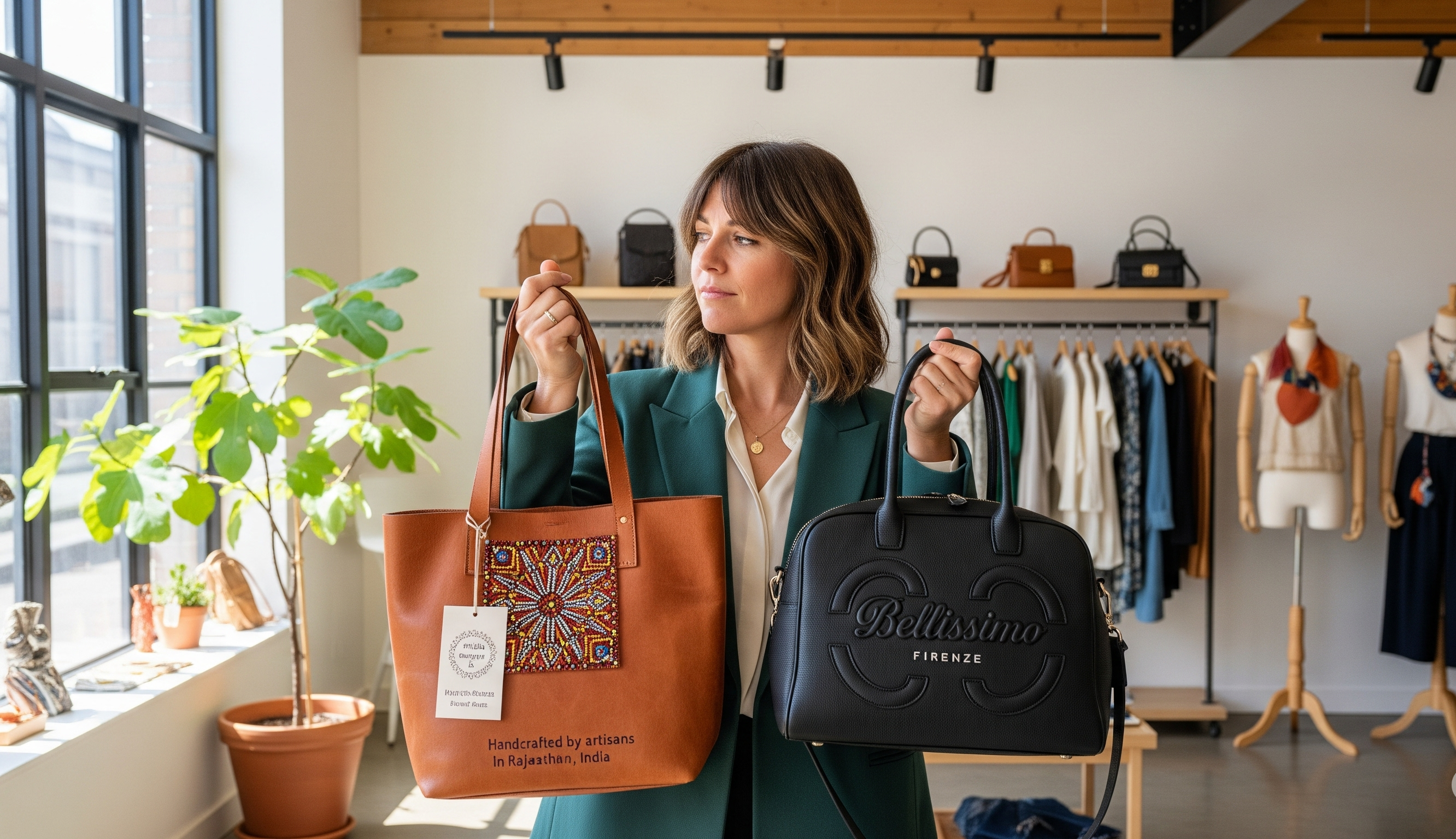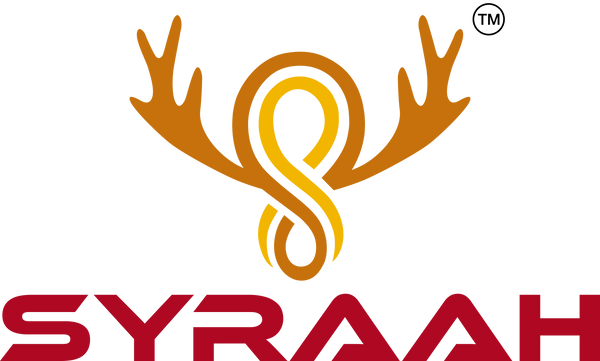
India vs Italy: Where Should UK Brands Source Leather Bags in 2025?
The Great Sourcing Debate – India vs Italy in 2025
In the world of luxury, leather bags remain a timeless symbol of craftsmanship and status. But as UK brands evolve towards ethical sourcing, transparency, and cost-efficiency in 2025, a critical question arises:
Should UK fashion labels source their leather bags from India or Italy?
Both countries are known globally for their legacy in leather. Italy brings centuries-old prestige and a reputation for luxury. India offers skilled artisanship, ethical sourcing, and unbeatable value. This blog breaks down the comparison for UK private label brands, sourcing managers, and emerging labels looking to make the smartest sourcing decisions in 2025.
Leather Legacy – India vs Italy
Italy’s leather heritage is globally admired. From Florence to Milan, Italian tanneries have long been the hallmark of refined quality, with brands like Gucci and Prada originating from these regions.
But India’s leather story is equally rich – rooted in regional artisan clusters like Kolkata, Chennai, and Kanpur. Here, generations of artisans handcraft bags with precision, blending tradition with modern design.
Legacy: Italy is known for its centuries-old fashion houses that have dominated the global luxury scene for decades. The country has established itself as a benchmark for high-end design, exclusivity, and traditional luxury. In contrast, India boasts deep-rooted generational artisan skills, passed down through families. Indian artisans infuse cultural heritage and handmade precision into every leather bag they produce, offering a rich legacy of craftsmanship rooted in tradition rather than corporate fashion houses.
Style Focus: Italian leather bags typically reflect a luxe, structured, and designer aesthetic. They're built for those who want opulence, architectural silhouettes, and brand prestige. On the other hand, Indian leather bags often embrace a more boho, minimalist, and functional style. They are designed with contemporary utility in mind, making them perfect for modern consumers who value both fashion and everyday usability.
Market Position: Italy firmly occupies the ultra-premium space in the global leather market, appealing to high-net-worth consumers and elite fashion boutiques. Meanwhile, India champions the affordable luxury segment. Indian manufacturers provide premium quality without the extravagant price tag, making them an ideal sourcing destination for UK startups, boutique labels, and growing brands seeking quality with ethical and cost-effective production.
Private Label Handbags UK – What Today’s Brands Want
UK’s fashion buyers are no longer impressed by labels alone. They’re seeking premium quality, transparency, and ethical values.
What matters in 2025:
➡️ India offers all the above, while Italian manufacturers often demand higher MOQs and longer timelines.
🔗 Read more: Syraah’s Private Label Leather Manufacturing Services
Ethical Sourcing – A Key Differentiator
Today’s UK consumers demand accountability from brands.
- India is emerging as a global hub for ethical leather production, with certified tanneries and women-led artisan clusters.
- Italy still leads in chrome-free tanning, but lacks artisan-level transparency.
Fair Wages: In Italy, fair wage practices are generally moderate and vary across factories, with some adhering to ethical norms while others focus primarily on commercial output. In contrast, India stands out with high ethical standards, especially through cooperatives and artisan-focused programs. These initiatives ensure that craftsmen and women are paid fairly, often exceeding local standards, and are supported with stable livelihoods.
Transparency: Italian manufacturers typically maintain transparency at the factory level, offering traceability mostly around production and materials. India, however, offers a more holistic approach to transparency—right from sourcing raw materials to showcasing artisan stories. Many Indian brands and manufacturers highlight the names, faces, and communities behind the products, giving B2B buyers in the UK a powerful narrative to share with their end customers.
Impact: The overall social impact of Italian manufacturing tends to be limited, as the focus is often on preserving luxury and legacy rather than grassroots transformation. On the other hand, sourcing from India directly contributes to high-impact change, particularly in rural areas. Every order supports employment, education, and empowerment of marginalized artisan communities, making it a meaningful choice for UK brands seeking purpose-driven partnerships.
🔎 UK B2B buyers are aligning with SDGs, ESG policies, and choosing suppliers like India that offer real, ground-level change.
🌐 Learn how Syraah empowers 1000+ artisans in India: Our Story
Cost & MOQ Comparison – A Dealbreaker for UK Startups
One of the biggest reasons UK brands prefer India in 2025 is flexibility.
Minimum Order Quantities: Indian manufacturers are highly flexible, often accepting small batch orders starting from just 50 to 100 units. This is ideal for UK-based startups or private label brands looking to test the market without overcommitting. In contrast, Italian manufacturers generally require much higher minimums—often 300 units or more—making it less accessible for small or emerging brands.
Sample Costs: Getting samples made in India is typically affordable, with many manufacturers offering refundable or low-cost sample development. On the other hand, Italian sample costs are considerably higher and are often non-refundable, increasing the upfront investment required for UK buyers.
Unit Cost: Leather bags manufactured in India are generally 40–60% more cost-effective than their Italian counterparts. This price advantage is primarily due to lower labor and operational costs in India. Italy, being part of the EU, has higher manufacturing costs driven by strict labor laws, higher wages, and regulatory expenses.
Delivery Time: Indian suppliers are capable of delivering bulk orders within 4–6 weeks, depending on the complexity of the design. Italian manufacturers often take 8–12 weeks to deliver due to slower production cycles and scheduling constraints.
Communication: Indian exporters are typically fluent in English and highly responsive, making communication seamless for UK buyers. In contrast, many small-scale Italian firms may have limited English proficiency, which can lead to delays or misinterpretations during the production and negotiation process.
For emerging UK private label handbag brands, India enables faster testing, smaller collections, and scalable production.
Design & Innovation – It’s Not One-Sided Anymore
In 2025, India has shattered the myth that design innovation is limited to Europe.
- Renesa Export now offer CAD prototyping, in-house designers, mood boards, and seasonal trend forecasting.
- Syraah work with UK buyers to develop exclusive styles that align with the latest market trends.
🔗 Explore our design capabilities and previous B2B collaborations here:
Logistics & Trade Advantage
Post-Brexit, the UK has had to reimagine sourcing and trade partnerships.
India’s growing FTAs with the UK, simplified import duties, and consolidated shipping hubs make sourcing seamless.
✅ Renesa Export provides:
- DDP shipping
- HS code clearance
- UK-standard labeling
- Factory photos + real-time updates
What UK B2B Buyers Are Saying
“We initially sourced from Italy for prestige. But the lead times, lack of flexibility, and cost drove us to India. Syraah has been a game-changer – small MOQs, custom designs, and our customers love the artisan story!”
— Owner, Ethical Boutique UK
“Indian manufacturers offer high-end quality at accessible rates. Renesa Export delivered a 500-unit tote collection on time, fully compliant with our specs.”
— Sourcing Manager, London Fashion Startup
Final Verdict – India Wins for UK Private Label in 2025
Ethical Sourcing: India wins with its strong focus on fair wages, artisan cooperatives, and transparent supply chains.
MOQ Flexibility: India takes the lead by accommodating small-batch orders, perfect for private label startups.
Price: India offers significantly lower production costs, giving it a clear advantage.
Prestige & Legacy: Italy wins in terms of historical brand prestige and heritage in luxury fashion.
Design Collaboration: It’s a tie — both countries offer skilled design collaboration, depending on the manufacturer.
Artisan Support & Storytelling: India shines here with its social impact, rich cultural stories, and community-based craftsmanship.
Speed & Service: India leads again with faster turnaround times and smoother English-language communication.
In 2025, India is the go-to destination for UK brands looking to build ethical, high-margin leather collections. With the right partners like Renesa Export and Syraah, UK private label buyers get the best of both worlds – quality + conscience.
📣 Call to Action
Ready to launch your private label handbag collection from India?
Partner with Renesa Export – trusted by UK buyers for quality, ethics, and affordability.
📞 +91 7384753618 | 📧 contact@syraahworld.com
🌐 www.syraahworld.com
FAQS
What is the key difference between leather bag manufacturers in India vs Italy?
The main difference lies in pricing and sourcing ethics. Indian manufacturers offer affordable luxury, artisan-crafted bags with flexible MOQs, while Italian manufacturers focus on high-end, heritage-rich designs at premium prices.
Are Indian leather bag manufacturers reliable for private label production?
Yes, many Indian leather bag manufacturers specialize in private label production, offering low MOQs, English communication, and custom branding tailored to UK startup brands and boutiques.
Is Italian leather better than Indian leather for premium bags?
Both countries offer high-quality leather. Italian leather is renowned for luxury finishes and heritage, while Indian leather is durable, eco-tanned, and competitively priced — making it ideal for scalable luxury.
What are the average MOQs for leather bag production in India vs Italy?
India typically offers lower MOQs starting from 50–100 units, whereas Italy often requires a minimum of 300 units or more — making India a better option for small to mid-size UK brands.
Which country is better for ethical leather sourcing: India or Italy?
India often outperforms Italy in ethical sourcing through artisan cooperatives, fair wage programs, and traceable supply chains, delivering both impact and transparency.
Can UK brands customize designs easily with Indian manufacturers?
Yes, Indian manufacturers are known for flexibility in customizations, accommodating unique designs, colors, linings, and even packaging, especially for private label and boutique buyers in the UK.
How do delivery timelines compare for India vs Italy?
Indian manufacturers typically deliver within 4–6 weeks, while Italian counterparts often take 8–12 weeks due to smaller workshops and limited communication.
Are Indian leather bags suitable for UK luxury markets?
Absolutely. Indian manufacturers now produce premium leather bags that meet global quality standards, combining affordability with luxurious finishes, making them suitable for high-end UK markets.
How do communication and service compare between Indian and Italian suppliers?
Indian manufacturers usually provide better communication in English, with faster responsiveness, dedicated account managers, and digital updates — an advantage for UK buyers.
Why are UK private label brands choosing India over Italy in 2025?
In 2025, more UK brands are shifting to India for ethical sourcing, cost efficiency, lower MOQs, and social impact. India offers speed, customization, and artisan support that align with modern B2B buyer values.

